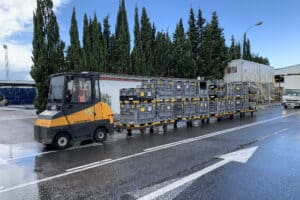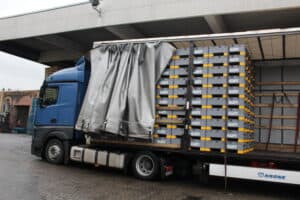 With the drive to transform the automotive industry into a sustainable operation, it is essential to reduce the environmental impact of manufacturing vehicles through removing waste from the supply chain.
With the drive to transform the automotive industry into a sustainable operation, it is essential to reduce the environmental impact of manufacturing vehicles through removing waste from the supply chain.
There is a significant amount of waste created through the automotive supply chain – waste in packaging and materials, wasted space, wasted time and wasted fuel costs and emissions.
Introducing returnable packaging can eliminate all areas of waste throughout the whole operation, saving OEMs and Tier Suppliers a significant amount of money which goes on the bottom line and helps them in their drive towards sustainability.
The time spent on the initial thought of the correct design and end product can save considerable costs across the lifetime of the vehicle.
This comes at a time when governments are on the cusp of introducing further financial penalties for the environmental impact created during the manufacturing process.
Today we see packaging engineers at tier suppliers and OEM’s who, for simplicity or time sake, go with what was used on the previous model. The time to present the business case for a new concept/idea can put packaging engineers off cost savings and innovation towards new ideas.
The way engineers can be encouraged to move new ideas and concepts forward is to let the suppliers help them by trusting them to put all the necessary facts together to make the business case work. Then have the confidence to put this forward to their senior colleagues to consider and adopt.
Wasted Packaging Materials
Introducing plastic returnable packaging removes the need for single-use packaging including plastic, cardboard, and wood which needs to be disposed of after use. This is both a cost and not environmentally friendly.
Foldable plastic bins can sufficiently replace steel racking and stillages requiring expendable packaging to transport components.
Wasted Space
When using steel stillages in the supply chain, there is a considerable quantity of wasted space per unit due to poor pack density. 
Poor pack density results in an increase in the number of stillages or bins which take up valuable space and increases costs as it will need make more trips. This in turn results in unnecessary emissions being created.
Wasted Fuel Costs and Emissions
Traditional packaging solutions are considerably heavier than using lightweight plastic. By using heavier packaging there are higher fuel costs and larger quantities of carbon emissions.
Wasted Time
It’s time to consider how much time is spent handling badly designed packaging at line side in OEM/Tier and EPC.
There is no need for parts and components to be sent to a handling facility to be unpacked from single use plastic to be repacked before going to the assembly line when using plastic returnable packaging.
Removing handling processes not only reduces costs, but speeds up the logistics process, making the operation more efficient.

